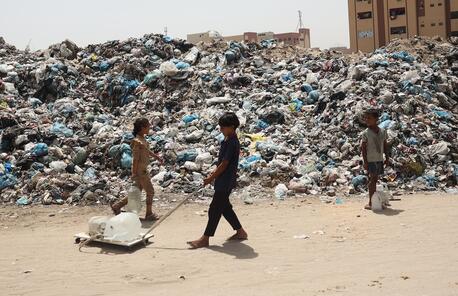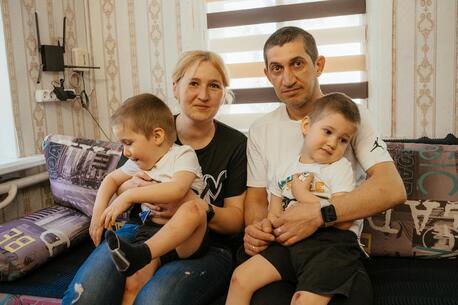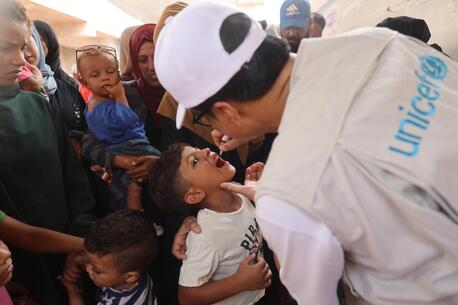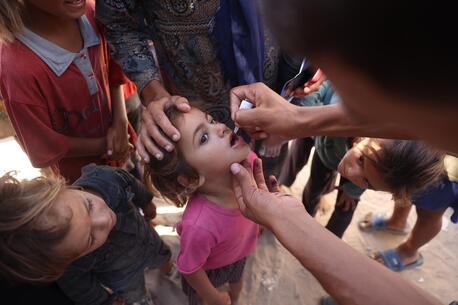
UNICEF Aids Children Caught in Water and Sanitation Crisis in Gaza
Some 1.8 million people — including more than 900,000 children — in the Gaza Strip require some form of humanitarian water, sanitation and hygiene (WASH) assistance.
Highly infectious poliovirus found in sewage samples
The ongoing bombardment of the Gaza Strip has created a dire water, sanitation and hygiene (WASH) crisis for children and their families. By May 2024, 60 percent of all WASH facilities in Gaza had been destroyed or severely damaged. Access to safe water for drinking and bathing, toilets and even soap remains severely limited.
On July 19, Gaza's Ministry of Health and the World Health Organization announced that the highly infectious poliovirus had been identified at six locations in sewage samples collected by UNICEF on June 23 from Khan Younis and Deir al Balah, putting thousands of people living in crowded camps for the internally displaced at risk of contracting the crippling disease.
Children are suffering as Gaza grapples with waste management
As pools of untreated sewage and heaps of uncollected waste grow, mothers are struggling to keep their children safe and healthy in increasingly unbearable conditions. Waterborne illnesses are spreading; many children are suffering from skin diseases and rashes.
I am itching all the time and I can't sleep at night. The children refuse to play with me, they are afraid of the rash on my skin. — Ahmad, 8
In Khan Younis, a mother held her young son, Wahid, in her arms. "The rash affected my son's life, the rash is spreading across his legs, and he can no longer walk because of the pain," she said.
"There's no clean water to bathe with," said 8-year-old Ahmad. "I am itching all the time and I can't sleep at night. The children refuse to play with me, they are afraid of the rash on my skin." Watch the video:
UNICEF supports water trucking, installation of septic tanks and repair of damaged infrastructure
The Gaza Strip has long suffered severe water problems; rehabilitating deteriorating infrastructure has been complicated by restrictions placed by Israeli authorities on the entry of construction materials, spare parts and equipment. Essential water and sanitation items such as pumps, drilling equipment and disinfectant chemicals are considered "dual use," meaning that they are only allowed into Gaza selectively.
When access is possible, UNICEF has supported water trucking to shelters and the distribution of bottled water and is providing water containers, chlorine tablets for water purification and distributing hygiene kits and hundreds of thousands of bars of soap.
To help limit the transmission of disease and reduce the risk of sewage overflow, UNICEF recently installed four septic tanks at Nasser Hospital in Khan Younis. "The project serves about 500 people within the medical complex, including health care providers, visitors and patient companions," said engineer Mohammed Abu Akar. Watch the video:
Working with partners to protect children's right to safe water and sanitation
UNICEF is also working with partners on services to help clean overflowing sewage, providing basic sanitation services at shelters, collecting solid waste and constructing emergency latrines.
Between May 30 and June 12, UNICEF:
- delivered critical emergency supplies including 13,400 water bottles and 38,400 collapsible water containers
- provided 283,019 liters of fuel allowing public and private water wells and desalination plants to produce clean water, benefitting more than 1,656,700 people, including over 600,000 children with lifesaving water for drinking and domestic needs in Deir Al Balah, Khan Younis, Rafah, and Middle Areas
- supported the restoration of six sewage pumping stations in Khan Younis, with one completed and others underway
- supported the construction of 695 latrines in Khan Younis and Deir Al Balah, benefitting more than 10,425 people
- expanded the Incentive-Based Program to address solid waste and environmental hygiene needs in overcrowded displacement sites to 21 shelters, benefitting over 52,500 people in the Middle Areas
Read the latest situation report to learn more about UNICEF's emergency response.
A WASH catastrophe unfolds
Since the escalation of hostilities following the Oct. 7, 2023 attack on Israel, UNICEF Executive Director Catherine Russell has repeatedly emphasized the lethal impact of the WASH crisis for children in Gaza. "The lack of clean water and safe sanitation is on the verge of becoming a catastrophe," Russell told the UN Security Council on Oct. 30. "Unless access to clean water is urgently restored, more civilians, including children, will fall ill or die from dehydration or waterborne diseases."
Nine months later, as the situation deteriorates further, UNICEF continues to call for an immediate, permanent ceasefire and the release of all hostages.
Access to safe drinking water and adequate sanitation facilities is a basic human right. UNICEF is working with partners to provide emergency services for children in Gaza. More help is needed. Please donate today.
HOW TO HELP
There are many ways to make a difference
War, famine, poverty, natural disasters — threats to the world's children keep coming. But UNICEF won't stop working to keep children healthy and safe.
UNICEF works in over 190 countries and territories — more places than any other children's organization. UNICEF has the world's largest humanitarian warehouse and, when disaster strikes, can get supplies almost anywhere within 72 hours. Constantly innovating, always advocating for a better world for children, UNICEF works to ensure that every child can grow up healthy, educated, protected and respected.
Would you like to help give all children the opportunity to reach their full potential? There are many ways to get involved.





